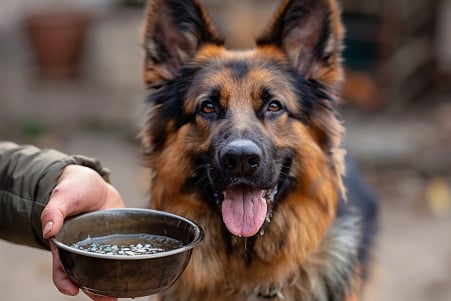Why Is My Dog Shaking and Panting? Causes and Concerns
31 May 2024 • Updated 31 May 2024

There are many reasons why your dog might be shaking and panting, ranging from excitement to medical concerns. However, it's important to know why your dog is experiencing these symptoms so that you can make sure they're safe and healthy. While some causes of shaking and panting in dogs are relatively harmless, such as anxiety or overheating, others can be more serious, including poisoning, kidney disease, pain, or even an immune disorder - so make sure to watch your dog's behavior closely and talk to your vet if you're worried.
Below, we'll cover some of the most common reasons why your dog might be shaking and panting, based on information from veterinarians and scientific studies, to help you better understand when you may need to be concerned and what you should do to make sure your dog is well.
What is causing my dog to shake and pant?
Why Is My Dog Shaking and Panting?
There are many reasons why your dog may be shaking and panting. Some of them are normal and nothing to worry about, while others may be a sign of a more serious issue.
One of the most common reasons for shaking and panting is anxiety, fear, or stress. Dogs may shake and pant as a way to cope with these feelings, according to Ethos Veterinary Health. Dogs may also shake and pant when they are excited or overstimulated, such as when they are playing or greeting their owners, according to the same source.
Shaking and panting can also be a sign of pain, discomfort, or an underlying medical condition. According to ElleVet Sciences, common medical issues that cause shaking and panting include bowel obstructions and pancreatitis. Shaking and panting can also be a sign of overheating, especially in hot weather or after exercise, according to the AKC, which notes that these symptoms may be a sign of dehydration.
Finally, some dogs are more prone to shaking and panting than others. For example, brachycephalic dogs, which are dogs with short snouts, such as pugs and bulldogs, are more likely to have breathing issues that cause them to pant more than other dogs, according to WebMD. By knowing the many reasons why your dog may be shaking and panting, you can better determine when these symptoms may be a sign of a more serious issue that requires a trip to the vet.
When to See a Vet
If your dog’s shaking and panting are accompanied by other symptoms such as difficulty breathing, vomiting, diarrhea, or collapse, the ASPCA says that you should seek immediate veterinary care. The VCA Animal Hospitals also notes that prolonged or excessive shaking and panting, especially when it’s accompanied by lethargy or a loss of appetite, can be a sign of a medical emergency and should be checked out by a vet.
If your dog has ingested a toxin or poison, it’s important to get them to the vet as soon as possible, according to PetHelpful. In addition, the TexVet Pets says that seizures, loss of consciousness, or signs of dizziness and imbalance are all reasons to seek medical care for your pet.
You should also contact your vet if the shaking and panting continue for more than a few hours or if you suspect that an underlying health issue is the cause. It’s important to get to the bottom of the issue so that you can help your dog feel better.
How to Help Your Dog at Home
If your dog is shaking and panting due to anxiety or stress, you can help by making sure they are in a calm, quiet environment and using soothing techniques like gentle petting or calming music, according to MasterClass. If your dog is shaking and panting due to heat, make sure they have access to fresh water and a cool, shaded area, according to the AKC.
You can also use natural remedies like CBD oil or calming supplements to help with anxiety-related shaking and panting, but make sure to talk to your vet first, according to Chillpaws. You can also use distraction techniques, like asking your dog to perform a simple command or activity, to help redirect their focus and reduce stress, according to VCA Animal Hospitals.
If your dog's symptoms don't improve, or if they get worse, don't try to treat them at home and instead take them to the vet right away, according to the Service Dog Training School. It's important to figure out what's causing your dog to shake and pant so that you can help them feel better.
How to Stop and Manage Anxiety-Related Shaking and Panting
According to PetMD, stress and anxiety are two of the most common causes of shaking and panting in dogs, so creating a stable routine and safe environment can help reduce these issues. In addition, Jacksonville Community Pet Clinics suggests that regular exercise and mental stimulation can help reduce anxiety and prevent symptoms.
If your dog is experiencing anxiety-related shaking and panting, desensitization methods, like slowly introducing your dog to their triggers in a safe space, can help, according to PetMD. Your vet may also recommend calming aids, such as pheromone diffusers, Thundershirts, or anti-anxiety medications, according to The PARC vet.
As the sources note, it’s important to figure out what’s causing your dog’s anxiety and work to manage it in the long term. By taking a holistic approach, pet parents can help their dogs feel better and maintain their happiness and health.
Conclusion: How to Make Sure Your Dog Is Comfortable and Healthy
From excitement to potential health issues, there are many reasons why dogs may shake and pant. Make sure to keep an eye on your dog and consult a vet if the issues don't go away or if they're happening in conjunction with other symptoms.
According to the Pet Health Network, there are many reasons why pets may shiver or shake, including pain, fear, anxiety, nerves, or simply being too cold. The article also says that excessive panting with shivering is a sign of stress, pain, or discomfort in pets.
ElleVet Sciences says that low blood sugar, heart or lung issues, anxiety, pain, and overheating can cause dogs to shake and pant. Meanwhile, WebMD lists several reasons dogs may shake, including distemper, generalized tremor syndrome, nausea, old age, pain, and poisoning.
No matter if the cause is anxiety, pain, or a medical issue, it's important to figure out why your dog is shaking and panting so that you can make sure they're comfortable and healthy. With the right treatment, care, and help from a vet, many of the reasons why dogs shake and pant can be managed and treated. This means that pet owners can help their dogs feel better and live their best lives by being aware and taking action.


